PROJECTS
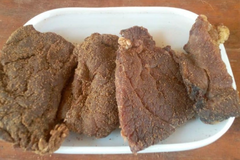
This project would teach and promote the use of solar meat drying technology to producers, suppliers, artisans, processors and traders in the meat management sector in Burkina Faso.
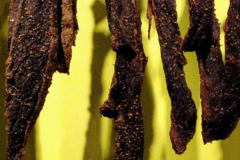
Aimed to develop a refined protocol for the production of healthy and nutritious dried meat (similar to biltong and kitoza) using solar driers that drastically reduce pathogens and increase the product's shelf life.
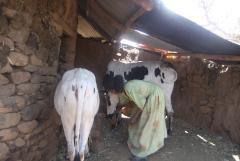
Aflatoxin M1 Health Risks vs. Benefits of Dairy Consumption in Ethiopian Children: An Epidemiological Trial and Risk-Benefit Analysis
This project was designed to determine whether aflatoxin M1 exposure in milk is associated with child growth impairment and to compare any risks with nutritional benefits of milk consumption in children.
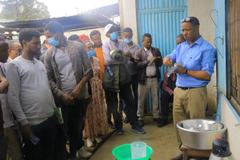
Creating Platform for Professionals in Ethiopia (C2P- Ethiopia): Strengthening and Accelerating Institutional Linkages Among Ethiopian Livestock Research, Learning, Development and Business Institutions
The project aimed to create an easy-to-use electronic platform that will accelerate effective communication among livestock actors and create system-level change in Ethiopia's livestock sector.
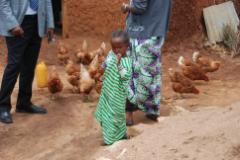
Improving Smallholder Poultry Production and Egg Consumption in Children Under Two in Ethiopia
This project was designed to improve smallholder poultry production through reducing poultry mortality, and to also to increase egg consumption in children under two in poultry owning households in Ethiopia.
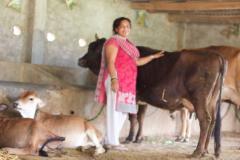
Socioeconomic Impact of the COVID-19 Pandemic on the Dairy Value Chain in Western Nepal
This project investigated effects of the COVID-19 Pandemic on the health and socioeconomic condition of children, local youth, women, and marginalized groups. It considers both qualitative and quantitative data from across the dairy value chain in rural areas.
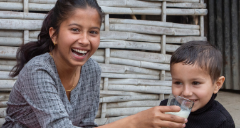
This project was designed to strengthen the dairy sector in Nepal through productivity and quality improvements, promoting farmer economic development, and increasing milk consumption by vulnerable household members.
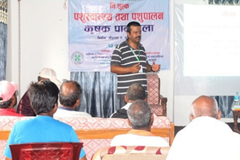
Translating Science into Policy and Practice for the Development of the Livestock Sector in Nepal
The project aimed to support the growth of Nepal's goat and dairy industry by strengthening institutional linkages, developing the technical capacity of professionals and increasing scientific understanding among stakeholders.

This project was designed to establish viable and sustainable business models for goat breeding centers where certified superior breeding goats are sold for a premium price and the community can run the business sustainably and profitably.
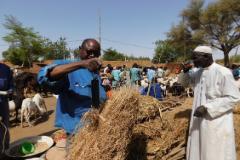
Enhancing the productivity and resilience of agro-pastoral systems, and income, food, and nutrition security through market-oriented innovations in Niger
This project was designed to reduce multidimensional poverty through market-oriented crop-livestock integration, and specifically to improve nutrition through on-farm diversification and by enhancing income and livelihood resilience of agro-pastoral systems in Niger.

One Health Approaches to Mitigate Brucellosis
This project would support small-scale farmers by mitigating the risk of brucellosis in livestock, farmers, and family members in Rwanda, Kenya and Uganda.
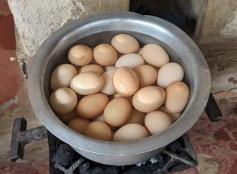
Cracking the Potential of Eggs to Improve Child Growth and Development in Rwanda
This project aimed to test the effects of maternal egg consumption during pregnancy on birth length. The project will also investigate the relationship between maternal egg consumption and other birth outcomes.

This project would assess the benefits of improved forage grasses and climate-smart agricultural practices on feed production and analyze their economic and environmental sustainability in smallholder dairy production systems in Nyanza, Burera, and Nyagatare districts in Rwanda
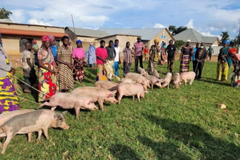
Enhancing the Pig Meat Quality and Safety Through a Training Program for Field Veterinarians and Slaughterhouse Personnel in Rwanda
The project was designed to train in-service professionals on pig meat inspection, and pork handling and selling.
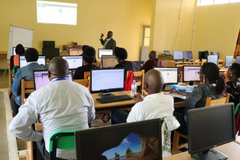
The project's main goal was to establish an academy that will serve as a hub for capacity development programs in the School of Veterinary Medicine at the University of Rwanda.
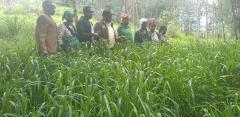
This project was about researching ways to improve livestock fodder production and its effect on human nutrition. Using computer models and stakeholder input, the research teams will develop maps, best-bet combinations of technologies and practices, and educational opportunities in Western Rwanda.
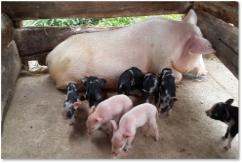
Profiting from Pigs in Rwanda: Improving People’s Lives and Livelihoods through More Productive Pig Farming
This project was designed to improve the lives of smallholder pig farmers and meet the nation’s increasing demand for pork. It is developing a package of good husbandry practices for farmers in the North and South of Rwanda while addressing common problems across the value chain. Additional outputs will include business models, genetic data, and outreach on pig keeping.
Système d’innovation en production animale (SIPA)
This project was designed to increase the productivity and resilience of the livestock sector in Haiti through targeted, applied, and integrated research and capacity development in animal nutrition and genetic improvement.
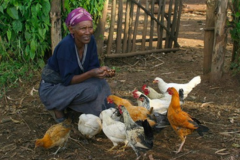
Advancing Genomic-Enabled Newcastle Disease Resistance in Chickens
This project was designed to increase the productivity and enhance Newcastle Disease resistance of indigenous poultry breeds in Ghana and Tanzania through genetic improvement, business planning, and capacity strengthening of poultry value chain actors.
-240x160.png)
Assessment of Aflatoxin-related Health Risk for Milk Consumers in Rural and Peri-urban Areas in Burkina Faso
This project generated primary evidence on the aflatoxin contamination levels in feed and milk in peri-urban and rural dairy systems in Burkina Faso and their health implications for dairy consumers. It also provides improved understanding of the rural and urban dairy value chains operating in the country and of points of leverage for improved milk quality and safety
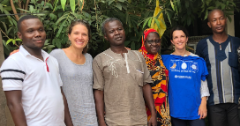
This project aimed to test the innovative behavior change strategy of gifting chickens to children by community champions to increase egg consumption among children under two.
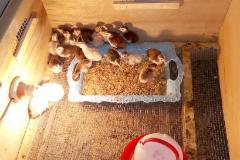
Intervention in Low Guinea Fowl Productivity and Related Products Consumption in Burkina Faso
This project aimed to expand guinea fowl farming among smallholder households by promoting year-round feeding of birds with fly larvae supplements for increased productivity; synchronizing hatching of guinea fowl eggs; and introducing low-cost evaporative cooling egg storage to increase fertile egg viability.
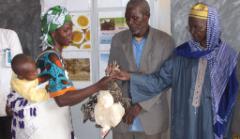
Enhancing Egg Consumption through Women’s Empowerment in Burkina Faso
This project built on the UF-led Focus project and examines various aspects of women’s empowerment and how behavior change messaging on the nutritional importance of eggs increase animal-source food consumption among infants and young children. It also examines the potential of livestock assets (chickens) to improve egg consumption in populations that have received repetitive nutrition and livestock information.
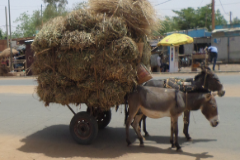
Enabling Value Chains to Create Sustainable Income for Vulnerable People in Crop-Livestock Systems of Burkina Faso and Niger
The project sought to contribute to food security and poverty alleviation by improving the value chains of crop-livestock systems related to small ruminants. It applies the Innovation Platform approach to unite stakeholders in the pursuit of transformational learning and best practices. Youth and women in particular are targeted for training and interventions for income-generating enterprises.
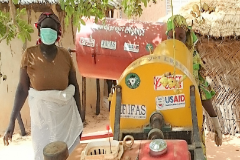
This project aimed to improve the development of appropriate production and post-harvest technologies in forage and feed value chains, animal feeds and feeding practices; strengthen capacity of small ruminant value chain actors to adopt technologies and innovations; disseminate best practices for parasites control and improve and disseminate policy recommendations related to the animal feed and fodder industry.
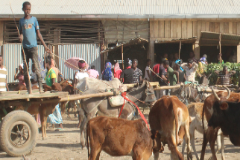
Linking Cattle Nutrition to Human Nutrition: A Value Chain Approach to Improving the Production, Handling, and Consumption of Animal Source Foods in Ethiopia
This project strived to create a systems approach that strengthens linkages among animal-source food production and consumption, practices, and human nutrition outcomes.
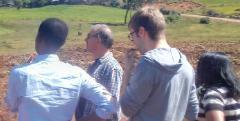
Improving the Evidence and Policies for Better Performing Livestock Systems in Ethiopia
The purpose of the project was to bring markets and consumption – on top of production – forward as an integral component into research on livestock systems. Insights into these aspects contribute towards more informed and evidence-based decision making and consequently to a better performing livestock sector in Ethiopia.
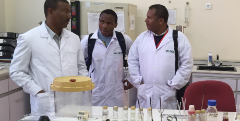
Addressing Young Stock Mortality in Smallholder Farms and Pastoral Herds of Ethiopia
The project goal was to understand causes and risk factors for young stock mortality in cattle, goats and camels, while also providing input on the pilot testing of health interventions.
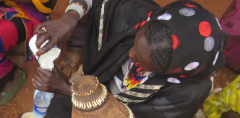
The goal of this project was to improve handling practices of milk and dairy products and thus improve food safety for pastoralists in Borana.
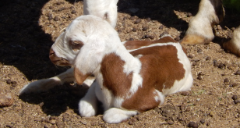
The Effect of Passive Surveillance Training on Animal Health Parameters, Northern Ethiopia
This project conducted a proof-of-concept research activity involving enhancement of awareness regarding recognition, reporting, and treatment of public and private good animal diseases.
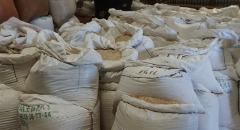
Mycotoxin Prevalence and Mitigation Measures in Ethiopia
This project assessed mycotoxin levels through a broad feed sampling at farmer cooperative unions (FCUs) working with the USDA-funded FEED project, enhances feed testing capacity, and communicates risk information for risk management.
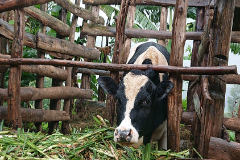
The main objective of this project was to demonstrate the use of an integrated decision support system (IDSS) as an analytic methodology for assessing the outcomes and impact of livestock research.
-240x160.png)
Modeling Livestock System Dynamics and Economywide Policy Impacts in Ethiopia
This project aimed to develop a systems-based analytical approach (model) to measure linkages of the livestock sector to the broader economy and to assess alternative national development scenarios.
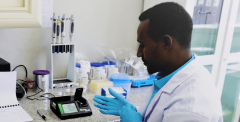
Feed-to-Farm Investigation of Mycotoxin Contamination of Feed and Milk in Ethiopia
This research provided the basis for identifying risk mitigation strategies in feed and in milk in two of Ethiopia’s vital milk-sheds, Addis Ababa and Hawassa. The information is necessary for the development of targeted data-driven measures to curb the production and transmission of mycotoxins in the livestock feed production chain.
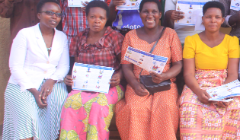
Enhancing Milk Quality and Consumption for Improved Income and Nutrition in Rwanda
The aim of the project was to contribute to efforts aimed at enhancing the quality and consumption of milk for improved income and nutrition in Rwanda.
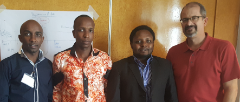
Assessment and Mitigation of Aflatoxin and Fumonisin Contamination in Animal Feeds in Rwanda
The main objective of this study is to assess and mitigate the prevalence of aflatoxins and fumonisins in animal feeds in Rwanda and to raise awareness among professionals and policy makers in order to better protect consumer health and increase export opportunities.
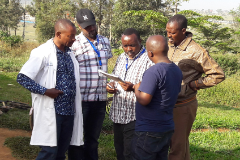
The overall objective of this project was to develop best practices that enhance dairy cow’s health and milk quality in the Rwandan dairy chain.
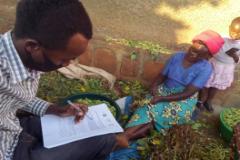
Challenges of Implementing Modern Milk Quality Standards in Developing Countries: Case of Rwanda
This project compiled the available evidence on the informal dairy subsector in Rwanda as well as conduct microbiological and physicochemical analyses to determine milk quality.
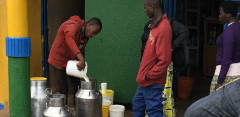
Rwanda Enhancement for Enabling Policy Support to the Dairy Sector
This project intended to analyze and develop policy options to enhance milk and milk products in Rwanda. Observation in the country indicates that there is a growing demand for processed milk products.
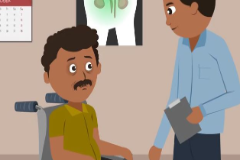
Aflatoxin Mitigation through Education, Intervention, and Policy in Rwandan Dairy Products
The main objective of this project is to improve animal-source food production and consumption through improved feed safety and quality.
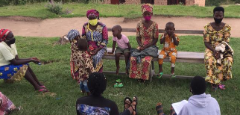
The main objective of this research project was to develop, implement, and evaluate an intervention to engage men in maternal and child nutrition—especially milk and animal-source food consumption.
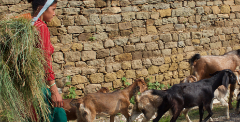
Designing and Evaluating Innovations for Development of Smallholder Female Livestock Cooperatives in Nepal
This project aimed to design, implement, and evaluate activities to improve the goat value chain, i.e., drought-resistant forage varieties; a distance learning platform to help women to become Community Animal Health Workers (CAHWs); and a text (SMS) message platform to improve efficiency and sustainability of goat production.
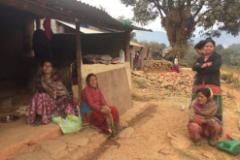
Empowerment of Village Women for Detection and Control of Livestock Diseases in Nepal
The main objective of this project was to establish a comprehensive program for reporting and controlling livestock disease in Nepal, based on the empowerment of village women and interactions with the Department of Livestock Services.
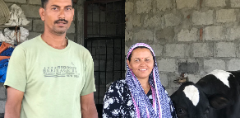
The primary objective of the project was to enhance the livelihoods of smallholder dairy farmers through increased income from productivity improvement of dairy animals by the effective control of mastitis. It takes place in Nepal.
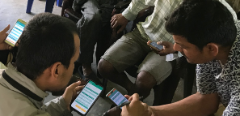
The overall goal of the project was to increase the household income and create improved livelihoods of smallholder dairy farmers through improvement of dairy animal productivity particularly through feeding management improvement.
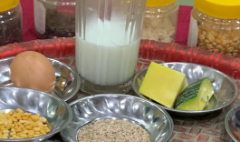
Strategies to Increase Milk Consumption Among Children in Rural Nepal
This project aimed to assess the relationship between household milk production and child milk consumption through understanding: 1) the extent to which good husbandry practice behavior change was sustained, 2) other factors related to child milk consumption; and 3) the relationship between milk consumption and child growth outcomes.
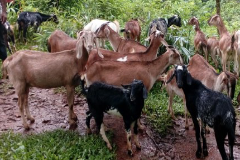
The overarching goal of this project was to sustainably improve goat breeding in order to improve the livelihoods of smallholder goat farmers, particularly women.
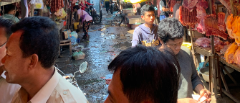
Safe Food, Fair Food for Cambodia
This project aimed to reduce the burden of foodborne disease in informal, emerging formal, and niche markets and targeting small and medium scale producers.
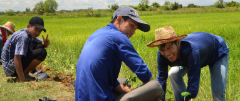
Living Fences for Improved Livestock Feed in Cambodian Smallholder Systems
The overall goal of this project was to examine the production of tree species as living fences for added nutrition and crop protection for Cambodian smallholder livestock systems.
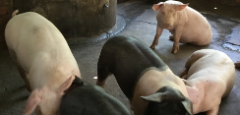
This project aimed to improve pig productivity on Cambodian smallholder farms by targeting two major factors that contribute to pig health: disease management and nutrition.

Peste des Petits Ruminants Vaccine Associate Award
The purpose of this project was to assess innovative approaches to PPR control using thermostable PPR vaccine and to build capacity to scale the vaccine across a broad region where the disease is endemic. It takes place in Rwanda and Kenya.
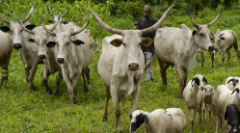
MAP-Market Analysis for Pastoralists
This project was designed to identify the right inclusive and innovative market interventions for pastoralists communities in Africa. Identification of such market interventions will contribute to improving the economy of pastoralists in Africa, reducing their poverty, and increasing their resilience. It takes place in Nigeria.

EQUIP—Strengthening Smallholder Livestock Systems for the Future
This project strived to improve the incomes, livelihoods and nutrition of smallholder farmers. It will do so through two areas of study: (1) increasing livestock productivity through increased supply of quality feeds (The Feed Study) and (2) testing an intervention strategy to reduce stunting in young children through egg consumption and reducing enteric dysfunction through improved chicken husbandry (The CAGED Study). It takes place in Ethiopia and Burkina Faso.
Feed the Future Innovation Lab for Livestock Systems is part of Feed the Future